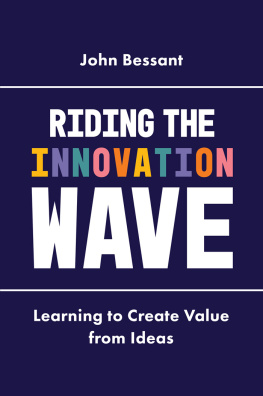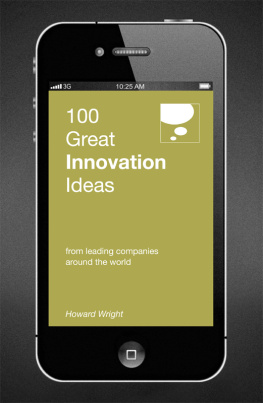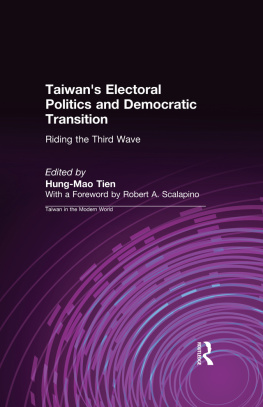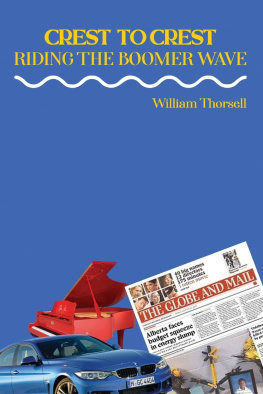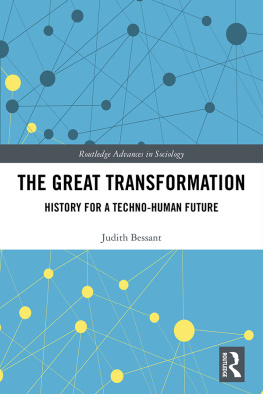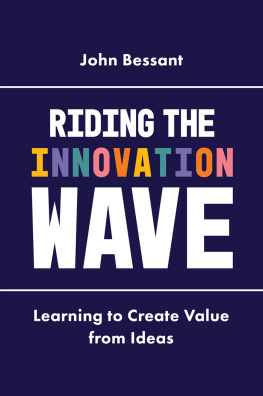J. R. Bessant - Riding the innovation wave : learning to create value from ideas
Here you can read online J. R. Bessant - Riding the innovation wave : learning to create value from ideas full text of the book (entire story) in english for free. Download pdf and epub, get meaning, cover and reviews about this ebook. year: 2017, genre: Home and family. Description of the work, (preface) as well as reviews are available. Best literature library LitArk.com created for fans of good reading and offers a wide selection of genres:
Romance novel
Science fiction
Adventure
Detective
Science
History
Home and family
Prose
Art
Politics
Computer
Non-fiction
Religion
Business
Children
Humor
Choose a favorite category and find really read worthwhile books. Enjoy immersion in the world of imagination, feel the emotions of the characters or learn something new for yourself, make an fascinating discovery.
- Book:Riding the innovation wave : learning to create value from ideas
- Author:
- Genre:
- Year:2017
- Rating:4 / 5
- Favourites:Add to favourites
- Your mark:
- 80
- 1
- 2
- 3
- 4
- 5
Riding the innovation wave : learning to create value from ideas: summary, description and annotation
We offer to read an annotation, description, summary or preface (depends on what the author of the book "Riding the innovation wave : learning to create value from ideas" wrote himself). If you haven't found the necessary information about the book — write in the comments, we will try to find it.
J. R. Bessant: author's other books
Who wrote Riding the innovation wave : learning to create value from ideas? Find out the surname, the name of the author of the book and a list of all author's works by series.
Riding the innovation wave : learning to create value from ideas — read online for free the complete book (whole text) full work
Below is the text of the book, divided by pages. System saving the place of the last page read, allows you to conveniently read the book "Riding the innovation wave : learning to create value from ideas" online for free, without having to search again every time where you left off. Put a bookmark, and you can go to the page where you finished reading at any time.
Font size:
Interval:
Bookmark:
RIDING THE INNOVATION WAVE
Learning to Create Value from Ideas
RIDING THE INNOVATION WAVE
Learning to Create Value from Ideas
BY
JOHN BESSANT
University of Exeter, UK

United Kingdom North America Japan India Malaysia China
Emerald Publishing Limited
Howard House, Wagon Lane, Bingley BD16 1WA, UK
First edition 2018
Copyright 2018 Emerald Publishing Limited
Reprints and permissions service
Contact:
No part of this book may be reproduced, stored in a retrieval system, transmitted in any form or by any means electronic, mechanical, photocopying, recording or otherwise without either the prior written permission of the publisher or a licence permitting restricted copying issued in the UK by The Copyright Licensing Agency and in the USA by The Copyright Clearance Center. Any opinions expressed in the chapters are those of the authors. Whilst Emerald makes every effort to ensure the quality and accuracy of its content, Emerald makes no representation implied or otherwise, as to the chapters suitability and application and disclaims any warranties, express or implied, to their use.
British Library Cataloguing in Publication Data
A catalogue record for this book is available from the British Library
ISBN: 978-1-78714-570-2 (Print)
ISBN: 978-1-78714-569-6 (Online)
ISBN: 978-1-78714-979-3 (Epub)
 |  |
Writing this book has been a fascinating process and a good practical example of a valuable innovation principle co-creation! Id like to extend my thanks to all the people at Hella who helped to shape it, through interviews, comments and discussions, especially in and around the I-Circle. In particular, it has been a pleasure to learn from former members of Hella, including Karl-Heinz Krcken, Thomas Netterscheid, Friedrich Trowitsch, Christian Waldeyer and Eberhard Zuckmantel; and from current staff including Christian Amsel, Rolf Breidenbach, Naveen Gautam, Michael Kleinkes Bernd Mnsterweg, Sabine Nierhoff, Michaela Schfer, Christoph Shnchen and Jason Waterman. A special thanks are due to Alexander Kerpe and colleagues at Hella Ventures Berlin for allowing me to observe a start-up starting up, and for many inspiring conversations.
Thanks are also due to Sebastian Korting and Lars Biermeyer who laboured hard in the background to support the many I-Circle meetings, and to the range of speakers and participants from across Hella who shared ideas and experiences. Im also very grateful to colleagues from outside Hella who provided stimulating ideas and input and generously shared their experiences Fabian Schlage (Nokia), Konstantin Gnge (Airbus), Kathrin Moeslein (FAU Errlangen-Nrnberg), Christoph Krois (Siemens), Carina Leue and Jrg Liebe (Lufthansa Systems).
I received tremendous support and encouragement from a variety of people and would especially like to thank Petra Reichel for all her kind help in organizing practical arrangements, Messrs Burkl and Stratmann for ensuring I made the various journeys to Lippstadt successfully and to the staff at the Hella Globe for hosting so many successful I-Circle meetings. Thanks are also due to Markus Richter and Enid Nagy for their help in reviewing and commenting on earlier drafts.
Id particularly like to mention Michael Jaeger who has been a powerful focus for innovation activity across the company and with whom Ive spent some fascinating days (and evenings in the bar!) talking around the many challenges of actually making innovation happen.
Most importantly, Id like to mention Jrgen Behrend for introducing me to the company and for sharing his deep insights into leading a large organization. At a time when we hear so much about values-based management it has been a pleasure to meet someone who lives out these principles so sincerely. Im also grateful to him for opening my eyes and ears to the delights of German literature; he has helped fix many key insights about innovation in my mind by his use of an apposite quotation from Schiller or Goethe.
Thanks are also due to the home team at Exeter (especially Bill Russell and Allen Alexander with whom I bounced many of the ideas around), to Steve Hardman (for his helpful advice and support) and to Pete Baker and Fiona Mattison at Emerald for helping the book come to life.
And, last but not least, my huge thanks to Anna and Lara for their patience, love and support.
Innovation is about survival of course. If we dont change what we offer the world and the ways in which we create and deliver it then we may not be around for long. In a competitive environment product/service and process innovation are part of the strategic imperative.
But its not just about being prepared to change we have limited resources so we need to make sure the ways in which we change are the right ones and that we balance the risks and the potential rewards. And we need to think strategically about this, building for the long-term as well as dealing with short-term challenges.
We also need to be able to leverage something we might be in the right place at the right time once but if we want to stay in the game we have to invest. Innovation is ideas knowledge converted into value and so we need to think about how to build and manage our knowledge base competence.
Knowledge isnt enough we also need to learn how to create value from it. Innovation isnt a magical event like the cartoons depicting a light-bulb magically flashing on above someones head. Its about turning those ideas knowledge into value, and that involves a long and uncertain journey. We might manage to get to our destination once by sheer good fortune, but being able to make the journey repeatedly needs much more in the way of a map, provisions, experience.
Successful innovation requires careful management, organizing key behaviours into embedded routines which define the way we approach the challenges of searching for opportunities, selecting the right ones and implementing innovation against a background of uncertainty.
And finally as if innovation wasnt already a tough enough order we also need to be able to step back from time to time and reflect on how well we are managing it. In a changing world are our recipes, our organizational structures and processes still the right ones? Do we to keep on, cut back or develop new routines? Does our approach to managing innovation still fit the world in which we are trying to operate? Besides the capability to turn knowledge into value we need a second order capability to reflect and learn, constantly tuning our approach what we could term dynamic capability.
So if we are serious about innovation then we need to be strategic in the ways we think about, organize and manage the process. Survival is not an accident.
In 1962 the Nobel Prize for Medicine was awarded to Frances Crick, James Watson and Maurice Wilkins for their work unravelling the structure of the DNA molecule. Together, with others in the team like Rosalind Franklin, they were able to open the door to our better understanding of genetics how characteristics are passed on from generation to generation. A century earlier Gregor Mendel was already experimenting with these ideas in his monastery garden in Austria but the key piece of the puzzle which eluded him was the structure and operational information which the DNA model provided.
Font size:
Interval:
Bookmark:
Similar books «Riding the innovation wave : learning to create value from ideas»
Look at similar books to Riding the innovation wave : learning to create value from ideas. We have selected literature similar in name and meaning in the hope of providing readers with more options to find new, interesting, not yet read works.
Discussion, reviews of the book Riding the innovation wave : learning to create value from ideas and just readers' own opinions. Leave your comments, write what you think about the work, its meaning or the main characters. Specify what exactly you liked and what you didn't like, and why you think so.

